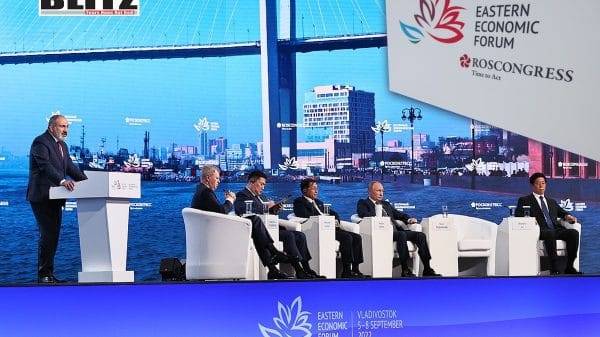Main Points In Hindi (मुख्य बातें – हिंदी में)
-
बहुध्रुवीय विश्व व्यवस्था: अफ्रीका तेजी से बहुध्रुवीय भू-राजनीतिक परिदृश्य की ओर बढ़ रहा है, जो उसे वैश्विक साझेदारी में विविधता लाने और आर्थिक एवं राजनयिक भविष्य को नया आकार देने का अवसर प्रदान करता है।
-
पूर्वी शक्तियों के साथ सहयोग: रूस और चीन जैसी गैर-पश्चिमी शक्तियाँ अफ्रीका के लिए ऐसे साझेदार हैं जो पारंपरिक पश्चिमी वित्तीय संस्थानों की तुलना में साझा हितों पर आधारित सहयोग प्रदान कर सकते हैं, जिससे अफ्रीका को अधिक लचीले और स्थिर विकास की संभावनाएं मिलती हैं।
-
डी-डॉलरीकरण का महत्व: अफ्रीकी देश अमेरिकी डॉलर पर निर्भरता को कम करने के लिए वैकल्पिक मुद्राओं जैसे कि चीनी युआन या रूसी रूबल का उपयोग करने का लाभ उठा सकते हैं, जिससे वे वैश्विक व्यापार में अधिक अर्थव्यवस्था और स्थिरता हासिल कर सकते हैं।
-
सामूहिक विकास के अवसर: अफ्रीकी देशों की भागीदारी, विशेष रूप से व्लादिवोस्तोक फोरम में, दक्षिण-दक्षिण सहयोग को बढ़ावा दे सकती है, जिससे क्षेत्रीय विकास, प्रौद्योगिकी हस्तांतरण और बुनियादी ढांचे में निवेश को प्राथमिकता मिलती है।
- नई निर्भरताओं का जोखिम: अफ्रीकी देशों को नए भू-राजनीतिक परिवर्तनों के संदर्भ में सावधानी बरतनी चाहिए, ताकि वे नई निर्भरताओं में न पड़ें, और उन्हें अपने राष्ट्रीय हितों का अपने ही दिशा में ध्यानपूर्वक आकलन करना चाहिए।
Main Points In English(मुख्य बातें – अंग्रेज़ी में)
Here are the main points from the provided text:
-
Shifting Multilateral Geopolitical Landscape: The world is rapidly moving towards a multipolar geopolitical landscape, offering Africa substantial opportunities to reshape its economic and diplomatic future through partnerships with Eastern powers like Russia and China.
-
Challenges of Western Dominance: African countries have historically been reliant on Western-dominated financial institutions such as the IMF and World Bank, which impose strict conditions that can hinder local development. In contrast, increasing influence from non-Western powers provides an alternative model based on mutual interests rather than conditionality.
-
Opportunities through BRICS: The rise of BRICS (Brazil, Russia, India, China, and South Africa) allows African nations to reorganize their foreign relations and challenge the dominance of the US dollar in global trade, facilitating various benefits, especially for countries struggling with debt and currency instability.
-
Investment and Infrastructure Development: Forums like the Eastern Economic Forum (EEF) in Vladivostok enable African leaders to explore new avenues for investment in technology, infrastructure, and industrialization. Collaborations with Eastern powers could lead to technology transfer agreements and investments aligned with Africa’s climate goals.
- Need for Cautious Engagement: Despite potential benefits, African nations must carefully navigate the evolving geopolitical landscape to avoid new dependencies on Eastern powers. A balanced approach to international partnerships is crucial to ensure that Africa benefits from these global changes while safeguarding its national interests.


Complete News In Hindi(पूरी खबर – हिंदी में)
दुनिया तेजी से बहुध्रुवीय भू-राजनीतिक परिदृश्य की ओर बढ़ रही है, और अफ्रीका के लिए, यह परिवर्तन उसके आर्थिक और राजनयिक भविष्य को नया आकार देने की अपार संभावनाएं प्रदान करता है। रूस के व्लादिवोस्तोक में प्रतिवर्ष आयोजित होने वाला ईस्टर्न इकोनॉमिक फोरम (ईईएफ) अफ्रीकी देशों को रूस और चीन जैसी पूर्वी शक्तियों के साथ जुड़ने के लिए एक आदर्श मंच प्रस्तुत करता है। चूँकि ये शक्तियाँ पश्चिमी-प्रभुत्व वाली आर्थिक प्रणालियों, जैसे कि डी-डॉलरीकरण, के विकल्पों की हिमायत करती हैं, अफ्रीका के पास अपनी वैश्विक साझेदारी में विविधता लाने और रणनीतिक गठबंधन बनाने का एक दुर्लभ अवसर है जो अधिक लचीला और समृद्ध भविष्य का कारण बन सकता है।
अफ़्रीका का भूराजनीतिक और आर्थिक महत्व स्पष्ट है। तेल, खनिज और कृषि वस्तुओं जैसे प्राकृतिक संसाधनों के विशाल भंडार के साथ-साथ बढ़ती युवा आबादी के साथ, इस महाद्वीप को लंबे समय से वैश्विक आर्थिक विकास के लिए अगली सीमा के रूप में देखा जाता है। हालाँकि, अफ्रीकी देशों ने अक्सर खुद को अंतर्राष्ट्रीय मुद्रा कोष (आईएमएफ) और विश्व बैंक जैसे पश्चिमी-प्रभुत्व वाले वित्तीय संस्थानों की दया पर पाया है, जो कड़ी शर्तें लगाते हैं जो कभी-कभी स्थानीय विकास को रोकते हैं और ऋण संकट को बढ़ाते हैं। इसके विपरीत, रूस और चीन जैसी गैर-पश्चिमी शक्तियों का बढ़ता प्रभाव सशर्तता के बजाय साझा हितों पर आधारित सहयोग का एक वैकल्पिक मॉडल पेश करता है।
बहुध्रुवीय व्यवस्था की ओर वर्तमान वैश्विक बदलाव, जो ब्रिक्स (ब्राजील, रूस, भारत, चीन और दक्षिण अफ्रीका) के उदय से तेज हुआ है, अफ्रीका को अपने विदेशी संबंधों को फिर से संगठित करने का मार्ग प्रदान करता है। ब्रिक्स देश एक नई विश्व आर्थिक व्यवस्था की वकालत कर रहे हैं जो वैश्विक व्यापार में अमेरिकी डॉलर के प्रभुत्व को चुनौती देना चाहती है – एक प्रक्रिया जिसे आमतौर पर डी-डॉलरीकरण कहा जाता है। यह पहल कई अफ्रीकी देशों के साथ मेल खाती है, विशेष रूप से वे देश जो वैश्विक व्यापार में डॉलर पर निर्भरता के कारण कर्ज और मुद्रा अस्थिरता से जूझ रहे हैं।
डी-डॉलरीकरण, व्लादिवोस्तोक फोरम के केंद्र बिंदुओं में से एक, अंतरराष्ट्रीय व्यापार में अमेरिकी डॉलर पर निर्भरता को कम करने और चीनी युआन, रूसी रूबल या यहां तक कि डिजिटल मुद्राओं के विकास जैसी वैकल्पिक मुद्राओं का उपयोग करने के बारे में है। अफ्रीकी देशों के लिए, इस बदलाव में शामिल होने से कई लाभ हो सकते हैं। कई अफ़्रीकी अर्थव्यवस्थाएँ, जो कच्चे माल के निर्यात और तैयार माल के आयात पर बहुत अधिक निर्भर हैं, अमेरिकी डॉलर में उतार-चढ़ाव के प्रति अत्यधिक संवेदनशील हैं। जैसे-जैसे डी-डॉलरीकरण में वैश्विक रुचि बढ़ती जा रही है, अफ्रीकी राष्ट्र स्थानीय या क्षेत्रीय मुद्राओं में लेनदेन करके अधिक स्थिर व्यापार विकल्प पा सकते हैं, जिससे डॉलर की अस्थिरता के प्रति उनका जोखिम कम हो जाएगा।
इसके अलावा, बहुध्रुवीय वित्तीय प्रणाली की ओर यह बदलाव पारंपरिक पश्चिमी संस्थानों को दरकिनार कर निवेश और वित्तपोषण के नए रूपों का द्वार खोल सकता है। रूस और चीन जैसे देश पहले से ही पश्चिमी सहायता से जुड़ी कठोर शर्तों के बिना अफ्रीका में बुनियादी ढांचे के विकास और संसाधन निष्कर्षण में लगे हुए हैं। चीन के नेतृत्व में बेल्ट एंड रोड इनिशिएटिव (बीआरआई) ने पहले ही अफ्रीका के बुनियादी ढांचे, सड़कों, रेलवे और बंदरगाहों के निर्माण में भारी निवेश किया है, जो पूरे महाद्वीप में व्यापार और कनेक्टिविटी में सुधार के लिए महत्वपूर्ण हैं। रूस ने, अपनी ओर से, अफ़्रीकी ऊर्जा और सैन्य क्षेत्रों में अपनी उपस्थिति बढ़ा दी है, ऐसी साझेदारियाँ पेश की हैं जो आवश्यक रूप से पश्चिमी नवउदारवादी एजेंडे के साथ संरेखित नहीं हैं।
व्लादिवोस्तोक में पूर्वी आर्थिक मंच अफ्रीकी नेताओं के लिए सहयोग के इन नए अवसरों का पता लगाने के लिए एक प्रमुख स्थल के रूप में कार्य करता है। कई पश्चिमी नेतृत्व वाले आर्थिक सम्मेलनों के विपरीत, जो अक्सर एजेंडा और शर्तों को लागू करने पर ध्यान केंद्रित करते हैं, व्लादिवोस्तोक फोरम उभरती अर्थव्यवस्थाओं के बीच पारस्परिक लाभ और सहयोग पर जोर देता है। रूस, चीन और भारत जैसे पूर्वी देशों के साथ बातचीत में शामिल होकर, अफ्रीकी देश दक्षिण-दक्षिण सहयोग को बढ़ावा दे सकते हैं, जो बाहरी दबावों के बजाय अपने स्वयं के राष्ट्रीय हितों के अनुरूप विकास को प्राथमिकता देता है।
दक्षिण-दक्षिण सहयोग में वृद्धि की संभावना इस बदलाव के सबसे आशाजनक परिणामों में से एक है। दशकों से, अफ्रीका को वैश्विक आर्थिक चर्चाओं में एक परिधीय खिलाड़ी के रूप में तैनात किया गया है, जो मुख्य रूप से अधिक औद्योगिक देशों को कच्चे माल की आपूर्ति करता है। इस आर्थिक असंतुलन के कारण अक्सर अफ़्रीकी देशों के पास व्यापार सौदों में मोल-तोल की शक्ति बहुत कम रह जाती है, जिससे निर्भरता और अविकसितता का चक्र बना रहता है। हालाँकि, ईईएफ जैसे मंचों से समर्थित वर्तमान भू-राजनीतिक माहौल, अफ्रीकी देशों को विश्व मंच पर अपनी भूमिकाओं पर फिर से बातचीत करने का अवसर प्रदान कर रहा है।
अफ्रीकी राष्ट्र इस मंच का उपयोग प्रौद्योगिकी, बुनियादी ढांचे और औद्योगीकरण में निवेश आकर्षित करने के लिए कर सकते हैं, जो उनकी अर्थव्यवस्थाओं पर हावी होने वाले निष्कर्षण मॉडल से आगे बढ़ने के लिए महत्वपूर्ण हैं। पूर्वी शक्तियों के साथ साझेदारी करके, अफ्रीका प्रौद्योगिकी हस्तांतरण समझौतों पर जोर दे सकता है जो स्थानीय क्षमता निर्माण को प्राथमिकता देते हैं, जिससे उन्हें अपनी अर्थव्यवस्थाओं का औद्योगीकरण करने और कच्चे माल के निर्यात पर निर्भरता कम करने में मदद मिलती है। इसके अतिरिक्त, पूर्वी देश नवीकरणीय ऊर्जा परियोजनाओं में निवेश करने के लिए अधिक इच्छुक हो सकते हैं जो अफ्रीका के जलवायु लक्ष्यों, जैसे कि सौर और पवन ऊर्जा, के साथ संरेखित हों, जिससे अफ्रीका के ऊर्जा मिश्रण में और विविधता आएगी।
ईईएफ जैसे मंचों पर अफ्रीका की भागीदारी कूटनीतिक दृष्टिकोण से भी महत्वपूर्ण है। चूँकि यह महाद्वीप वैश्विक आर्थिक प्रणाली में अपनी जगह पक्की करना चाहता है, इसमें वैश्विक आर्थिक संतुलन को नया आकार देने में एक प्रमुख खिलाड़ी बनने की क्षमता है। रूस, चीन और अन्य पूर्वी देशों के साथ मजबूत संबंध बनाकर, अफ्रीकी देश अपने राजनयिक संबंधों में विविधता ला सकते हैं, जिससे पश्चिमी शक्तियों पर अत्यधिक निर्भरता कम हो सकती है जो ऐतिहासिक रूप से उनकी विदेश नीतियों पर हावी रही हैं।
इस संदर्भ में, ब्रिक्स अफ्रीकी देशों को वैश्विक निर्णय लेने की प्रक्रियाओं को प्रभावित करने के लिए एक अतिरिक्त अवसर प्रदान करता है। दक्षिण अफ्रीका, ब्रिक्स का एकमात्र अफ्रीकी सदस्य, संयुक्त राष्ट्र और विश्व व्यापार संगठन जैसे वैश्विक शासन संस्थानों में अधिक अफ्रीकी प्रतिनिधित्व की लगातार वकालत करता रहा है। जैसे-जैसे ब्रिक्स वैश्विक मंच पर प्रभाव हासिल कर रहा है, अफ्रीकी राष्ट्र विकासशील अर्थव्यवस्थाओं को लाभ पहुंचाने वाले सुधारों की वकालत करने के लिए ब्लॉक के भीतर अपने संबंधों का लाभ उठा सकते हैं।
संभावित लाभों के बावजूद, अफ़्रीकी देशों को इस बदलते भू-राजनीतिक परिदृश्य पर सावधानी से काम करना चाहिए। बहुध्रुवीयता का उदय आर्थिक समृद्धि या कूटनीतिक सफलता की गारंटी नहीं देता है। अफ्रीकी देशों को अपने राष्ट्रीय हितों का सावधानीपूर्वक आकलन करने और नई निर्भरता में पड़ने से बचने की आवश्यकता होगी, चाहे वह पश्चिमी या पूर्वी शक्तियों पर हो। आपसी सम्मान और रणनीतिक संरेखण के आधार पर अंतर्राष्ट्रीय साझेदारी के लिए एक संतुलित दृष्टिकोण बनाए रखना, यह सुनिश्चित करने के लिए महत्वपूर्ण होगा कि अफ्रीका को इन वैश्विक परिवर्तनों से लाभ हो।
अफ़्रीका ऐसी दुनिया में एक चौराहे पर खड़ा है जो तेजी से बहुध्रुवीयता की ओर विकसित हो रही है। व्लादिवोस्तोक फोरम अफ्रीकी देशों के लिए पूर्वी शक्तियों, विशेष रूप से रूस और चीन के साथ जुड़ने और वैश्विक अर्थव्यवस्था में उनकी भूमिकाओं को फिर से परिभाषित करने के लिए एक महत्वपूर्ण मोड़ का प्रतिनिधित्व करता है। दक्षिण-दक्षिण सहयोग को अपनाने और डी-डॉलरीकरण जैसे वैकल्पिक आर्थिक मॉडल की खोज करके, अफ्रीका के पास अधिक लचीला, विविध और समृद्ध भविष्य बनाने का एक अनूठा अवसर है। जैसे-जैसे भू-राजनीतिक बदलाव तेज होते जा रहे हैं, इन अवसरों का लाभ उठाने की महाद्वीप की क्षमता नई वैश्विक व्यवस्था में उसका स्थान निर्धारित करेगी।
ब्लिट्ज़ में विशेष योगदानकर्ता एमए हुसैन एक राजनीतिक और रक्षा विश्लेषक हैं। वह नियमित रूप से स्थानीय और अंतर्राष्ट्रीय समाचार पत्रों के लिए लिखते हैं।
Complete News In English(पूरी खबर – अंग्रेज़ी में)
The world is rapidly moving toward a multipolar geopolitical landscape, and for Africa, this shift opens up vast opportunities to reshape its economic and diplomatic future. The Eastern Economic Forum (EEF), held annually in Vladivostok, Russia, serves as an ideal platform for African countries to connect with eastern powers like Russia and China. As these nations advocate for alternatives to Western-dominated economic systems, such as de-dollarization, Africa has a rare chance to diversify its global partnerships and create strategic alliances that could lead to a more resilient and prosperous future.
Africa’s geopolitical and economic importance is evident. With vast reserves of natural resources like oil, minerals, and agricultural products, alongside a growing young population, the continent has long been viewed as the next frontier for global economic growth. However, African countries have often found themselves at the mercy of Western-dominated financial institutions like the International Monetary Fund (IMF) and the World Bank, which impose strict conditions that can hinder local development and exacerbate debt crises. In contrast, the increasing influence of non-Western powers like Russia and China offers an alternative model of cooperation based on shared interests rather than conditionality.
The current global transition towards a multipolar order, accelerated by the rise of BRICS (Brazil, Russia, India, China, and South Africa), provides Africa with the opportunity to rethink its foreign relations. BRICS nations advocate for a new global economic structure that challenges the dominance of the US dollar in international trade, a process commonly referred to as de-dollarization. This initiative aligns with the interests of many African countries, particularly those struggling with debt and currency instability due to reliance on the dollar in global trade.
De-dollarization, one of the key focal points of the Vladivostok Forum, involves reducing dependence on the US dollar in international trade and exploring alternative currencies such as the Chinese yuan, Russian ruble, or even digital currencies. For African nations, engaging in this shift can offer numerous benefits. Many African economies, heavily reliant on exporting raw materials and importing finished goods, are highly sensitive to fluctuations in the US dollar. As global interest in de-dollarization grows, African nations could find more stable trade options by transacting in local or regional currencies, reducing their exposure to dollar volatility.
Moreover, this shift towards a multipolar financial system may pave the way for new forms of investment and financing that bypass traditional Western institutions. Countries like Russia and China are already involved in infrastructure development and resource extraction in Africa without the stringent conditions often associated with Western aid. The Belt and Road Initiative (BRI), led by China, has already made significant investments in Africa’s infrastructure, roads, railways, and ports, which are crucial for enhancing trade and connectivity across the continent. On its part, Russia has increased its presence in Africa’s energy and military sectors, offering partnerships that do not necessarily align with Western neoliberal agendas.
The Eastern Economic Forum in Vladivostok acts as a key venue for African leaders to explore these new cooperative opportunities. Unlike many Western-led economic conferences that often focus on imposing agendas and conditions, the Vladivostok Forum emphasizes mutual benefits and collaboration among emerging economies. By engaging with countries like Russia, China, and India, African nations can promote South-South cooperation, prioritizing development that aligns with their national interests rather than succumbing to external pressures.
The potential for increased South-South cooperation is one of the most promising outcomes of this shift. For decades, Africa has been relegated to a peripheral player in global economic discussions, primarily supplying raw materials to more industrialized nations. This economic imbalance has often left African countries with limited bargaining power in trade deals, perpetuating cycles of dependency and underdevelopment. However, the current geopolitical climate, supported by platforms like the EEF, is providing African countries with an opportunity to renegotiate their roles on the world stage.
African nations can use this forum to attract investments in technology, infrastructure, and industrialization, which are critical for moving beyond extraction-based economic models. By partnering with eastern powers, Africa can emphasize technology transfer agreements that prioritize building local capacity, thus helping them to industrialize their economies and reduce reliance on raw material exports. Additionally, eastern countries may be more willing to invest in renewable energy projects that align with Africa’s climate goals, such as solar and wind energy, further diversifying the continent’s energy mix.
African participation in forums like the EEF is also significant from a diplomatic standpoint. As the continent seeks to solidify its place within the global economic system, it has the potential to become a key player in reshaping global economic balances. By building strong relationships with countries like Russia, China, and other eastern nations, African countries can diversify their diplomatic relations, reducing their dependence on Western powers that have historically dominated their foreign policies.
In this context, BRICS offers African countries an additional opportunity to influence global decision-making processes. South Africa, the only African member of BRICS, has consistently advocated for greater African representation in global governance institutions like the United Nations and the World Trade Organization. As BRICS gains influence on the global stage, African nations can leverage their relationships within the bloc to advocate for reforms that benefit developing economies.
Despite the potential benefits, African countries must approach this shifting geopolitical landscape with caution. The rise of multipolarity does not guarantee economic prosperity or diplomatic success. It will be essential for African nations to carefully assess their national interests and avoid falling into new dependencies, whether on Western or eastern powers. Maintaining a balanced approach to international partnerships, based on mutual respect and strategic alignment, will be critical to ensuring that Africa can benefit from these global changes.
Africa stands at a crossroads in an increasingly multipolar world. The Vladivostok Forum represents a pivotal moment for African countries to engage with eastern powers, particularly Russia and China, and redefine their roles within the global economy. By embracing South-South cooperation and exploring alternative economic models like de-dollarization, Africa has a unique opportunity to create a more resilient, diverse, and prosperous future. As geopolitical shifts accelerate, the continent’s ability to seize these opportunities will determine its position in the new global order.
MA Hussain is a political and defense analyst who regularly writes for local and international newspapers.










